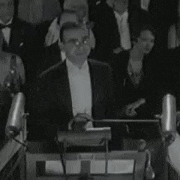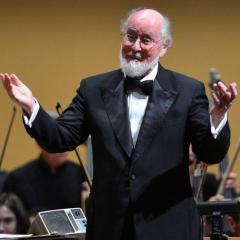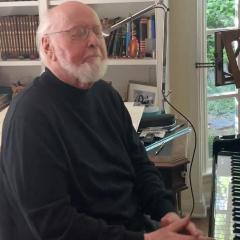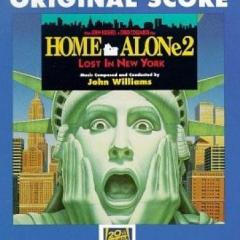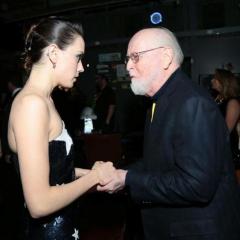
Lewya
-
Posts
937 -
Joined
-
Last visited
-
Days Won
2
Reputation Activity
-
 Lewya got a reaction from Chewy in Which two scores would you recommend to a complete novice and why?
Lewya got a reaction from Chewy in Which two scores would you recommend to a complete novice and why?
I would never go for the poor Titanic or a relatively mediocre pastiche score like HP 3. Neither of them are "essential" nor do they represent film music at its best. You could argue that Titanic is even a score that gave film music a bad reputation.
A Streetcar Named Desire and East of Eden would be two good candidates to begin with though I think. Why? Because they used modern music and both of the scores contain music that represents film music at its best. At their best, they have never been surpassed in the field. Both by two of the most formidable composers to ever work in the field as well.
-
 Lewya got a reaction from Holko in Which two scores would you recommend to a complete novice and why?
Lewya got a reaction from Holko in Which two scores would you recommend to a complete novice and why?
I would never go for the poor Titanic or a relatively mediocre pastiche score like HP 3. Neither of them are "essential" nor do they represent film music at its best. You could argue that Titanic is even a score that gave film music a bad reputation.
A Streetcar Named Desire and East of Eden would be two good candidates to begin with though I think. Why? Because they used modern music and both of the scores contain music that represents film music at its best. At their best, they have never been surpassed in the field. Both by two of the most formidable composers to ever work in the field as well.
-
 Lewya got a reaction from John in Which two scores would you recommend to a complete novice and why?
Lewya got a reaction from John in Which two scores would you recommend to a complete novice and why?
I would never go for the poor Titanic or a relatively mediocre pastiche score like HP 3. Neither of them are "essential" nor do they represent film music at its best. You could argue that Titanic is even a score that gave film music a bad reputation.
A Streetcar Named Desire and East of Eden would be two good candidates to begin with though I think. Why? Because they used modern music and both of the scores contain music that represents film music at its best. At their best, they have never been surpassed in the field. Both by two of the most formidable composers to ever work in the field as well.
-
 Lewya got a reaction from Fabulin in Which two scores would you recommend to a complete novice and why?
Lewya got a reaction from Fabulin in Which two scores would you recommend to a complete novice and why?
I would never go for the poor Titanic or a relatively mediocre pastiche score like HP 3. Neither of them are "essential" nor do they represent film music at its best. You could argue that Titanic is even a score that gave film music a bad reputation.
A Streetcar Named Desire and East of Eden would be two good candidates to begin with though I think. Why? Because they used modern music and both of the scores contain music that represents film music at its best. At their best, they have never been surpassed in the field. Both by two of the most formidable composers to ever work in the field as well.
-
 Lewya got a reaction from The Five Tones in Ennio Morricone is complimentary but critical of John Williams in his new book
Lewya got a reaction from The Five Tones in Ennio Morricone is complimentary but critical of John Williams in his new book
In his new biography Ennio Morricone: In His Own Words, Ennio Morricone is complimentary but critical of John Williams - Star Wars scores in particular.
"My criticism was not directed to Star Wars in particular, which I enjoyed a lot from the very beginning of the saga, but the scoring style which (especially Hollywood) composers and directors have made us used to. I attempted a new direction with my score for The Humanoid by Aldo Lado, in which I devised a six-voice double fugue based on tonal harmony (the six voices were split in half between the orchestra and the organ, with a double subject and a double countersubject). The piece was titled "Incontro a sei" (Six-Faced Encounter):
The work was grueling, but very stimulating at the same time. Although the production could not remotely compete with Star Wars, to me this piece seemed to somewhat mirrror the imaginary of the universe, the infinite spaces and the sky, without giving in to clichés. Obviously, such experiments were self-imposed necessities, rather than obligatory pathways. Still, speaking both as a composer and a filmgoer, I believe that a rather simplistic standardization of stylistic choices has made film music less interesting over the years, in terms of both conceptional depth and compositional methods."
Morricone said that Williams is “an exceptionally gifted composer whom I greatly respect”, but even he is criticised for making “a commercial choice” about the space epic franchise. It was, he says, “understandable, but still commercial. I could not have scored Star Wars in that way”.
He adds: “What seems hazardous to me is to associate a march, no matter how well written, to outer space. Oftentimes, solutions of this sort stem not so much from the lack of creativity or skills, but from mere commercial concerns – as consequences of the rules imposed by the film industry … Speaking both as a composer and a filmgoer, I believe that a rather simplistic standardisation of stylistic choices has made film music less interesting over the years, in terms of both conceptual depth and compositional methods.”
-

-

-
 Lewya got a reaction from The Illustrious Jerry in Hans Zimmer's DUNE (2021)
Lewya got a reaction from The Illustrious Jerry in Hans Zimmer's DUNE (2021)
Zimmer.
Hopefully it won't be another horrible Dunkirk score. His Blade Runner score was just OK. The most recent Zimmer score I really liked was Inception. Not a big fan of Zimmer at all though.
-

-

-
 Lewya got a reaction from Sharkissimo in The Leonard Rosenman Thread
Lewya got a reaction from Sharkissimo in The Leonard Rosenman Thread
It is extremely rare that a film composer receives this kind of attention from leading concert composers, so Rosenman must have done things right.
Both John Adams and John Corigliano are fans of him, especially of East of Eden and Rebel Without a Cause with Adams favoring the latter and Corigliano the former. Rosenman himself considered East of Eden his best score.
Here is what John Adams wrote about Rosenman in liner notes in the East of Eden and Rebel Without a Cause recording he conducted:
Leonard Rosenman is an important transitional figure in the history of film music: a highly skilled composer whose best work evolved during a critical period between that of old school Europeans like Max Steiner and Dimitri Tiomkin and that of the later, more pop-oriented composers of the 60s, 70s and beyond. Rosenman was doubtless one of the most thoroughly schooled musicans ever to work in Hollywood. Before making an acquaintance of director Elia Kazan in New York in 1954, he studied composition and theory at the University of California, Berkeley with Roger Sessions, the most serious of all serious composers. He was thoroughly familiar with all the latest modern techniques in the works of Stravinsky, Bartók and Schoenberg. Most importantly, he possessed one thing Sessions lacked: the common touch, an ability to mirror the American vernacular experience in his music. This was an essential ability for anyone hoping to make a successful foray into commcercial film music.
East of Eden, Rosenman's first score was an ideal vehicle for his talents. The John Steinbeck story combines homespun simplicities of mid-century American social realism with the darker, more symbolic themes of filial disobedience and Oedipal search for his the lost mother. Set among the lush and irresistible beauty of the northern California coast, this 1955 film took the young James Dean into almost instant celebrity in the role of the tormented, misunderstood and unappreciated brother and son. The story, with its consciously Old Testament motifs acted by an ensemble of exceptionally gifted performers, including Julie Harris, Raymond Massey and Burl Ives, is one of the better examples of what a major Hollywood film could achieve.
Rosenman's score is, when required, appropriately evocative of a "simple" American past (the story takes place during World War I). He utilizes both the widely spaced harmonies and simple diatonic tunes made famous by Copland, but Rosenman's ideas are never whole-cloth borrowings. His music has its own originality. The famous "Main Theme" with its innocent, almost childlike 3/4 lilt is one of the most memorable melodies in all American cinema. The music matches the qualities of Steinbeck's prose with uncanny exactness, at one moment being simple and plainspoken to the point of rusticity, and then modulating abruptly to a suppressed brooding that is far more sophisticated and self-aware than any earlier example of music for the screen.
Written a year later, Rebel Without a Cause was musically even more successful, although the film, with its portrayal of misguided, troubled American youth, lacked the depth and richness of the Steinbeck story. While East of Eden was a period piece evoking for the American viewer an already lost idyllic past, Rebel Without a Cause was harshly contemporary and showed a strong influence of film noir in its treatment of the subject and characters. It may well be the film that created the whole "Fifties" stereotype, with its pompadour male hairstyles, car fetishes, and gangs of disaffected teenagers given to casual violence and unable to communicate with their uncomprehending elders. It is perhaps not insignificant that his film predates the premiere of West Side Story by two years.
For the film, which provided another starring role for James Dean and an early appearance by all-too-worldly Natalie Wood, Rosenman created a complex score that moves effortlessly between the urban big band jazz of Stan Kenton and the moody atmospheres of Bartók and Stravinsky. Bartók's Music for Strings, Percussion and Celesta, hardly known to the general public in 1955, makes a particularly evocative model in film's "planetarium" scene, during which the 50s' newfound preoccupation with outer space and extraterrestial events is eerily worked into the film's existential themes. The fractured rhythms and polytonalities of Stravinsky's Rite of Spring are felt in the scenes of violence and terror, although here, as elsewhere, Rosenman never loses his own original voice. Unlike many a lesser film composer, Rosenman managed to avoid resorting to hasty pastiche or overt borrowing. The two scores show what could actually be achieved when a skilled composer and a director sensitive to the powers of music were allowed to work together under conditions of artistic freedom, unimpeded by the crush of market forces - a rare moment in an industry in which art and money always maintain a difficult equipoise. - JOHN ADAMS
During Sunday's pre-concert talk, conductor John Adams – who recorded Rosenman's East of Eden and Rebel Without a Cause suites for Nonesuch in 1995 – described the composer as "one of the most important, skilled and knowledgeable of all film composers." "Adams took the microphone during the concert to extol Rosenman's virtues, calling him a "sophisticated composer" who helped to bring "psychological depth" to 1950s films like Rebel Without a Cause."
John Corigliano: "East of Eden with Leonard Rosenman's music, is a great film on every level. It's like a combination of Berg and Barber and it's beautiful, and it has a simple American melody also of pure innocence. That score is great. It's so powerful, and in addition to that highly chromatic and nervous, wonderful sinewy beauty he also has an innocence like Copland. It should have a symphonic version played by major orchestras".
-
 Lewya got a reaction from TownerFan in Here is what other composers are saying about John Williams
Lewya got a reaction from TownerFan in Here is what other composers are saying about John Williams
https://michaeldaughertycomposer.com/interviews/michael-daugherty-discusses-his-creative-process-with-robert-raines/
-
 Lewya got a reaction from Fabulin in A Clockwork Orange vs. Blade Runner
Lewya got a reaction from Fabulin in A Clockwork Orange vs. Blade Runner
Blade Runner by far in both categories. Both the score and film is top 10 of all time material.
-
 Lewya got a reaction from Joni Wiljami in Here is what other composers are saying about John Williams
Lewya got a reaction from Joni Wiljami in Here is what other composers are saying about John Williams
Michael Daugherty: "The wonderful music of John Williams is old school: you hear counterpoint, counter melodies, great orchestrations, changes of tempo and rubatos. I must say, I miss the old days of film music; the scores of Alfred Newman, Max Steiner and Bernard Herrmann for example. That way of composing virtuosic film music may come back someday, but at the moment we are in a very technologically driven world of film music, that, in my personal opinion, has inhibited the creative possibilities."
-
 Lewya got a reaction from Eplicon in Ennio Morricone is complimentary but critical of John Williams in his new book
Lewya got a reaction from Eplicon in Ennio Morricone is complimentary but critical of John Williams in his new book
He did (and yes, I know that there are more modernistic elements in his score, but still that is not what most of the score was about, it was retro).
-
 Lewya got a reaction from JoeinAR in The Shawshank Redemption vs Schindler's List
Lewya got a reaction from JoeinAR in The Shawshank Redemption vs Schindler's List
Another poll, I need to know what people here prefer - for fun.
The Shawshank Redemption for me on both counts - Shawshank is one of my top 25 scores of all time, Schindler's List wouldn't even make my top 100.
The Shawshank Redemption is simply a stunning score, Williams himself singled it out as one of the most impressive scores he had heard from the younger generation. The Schindler's List score may be good (I easily prefer Jurassic Park from the same year though), but it was never one of my favourite Williams scores and I feel it is probably even overrated. I find the score too maudlin and sentimental - the obnoxious choral moments are easily the worst. Newman's understated, moving and elegant effort is clearly the superior score for me. I still listen quite regularly to a handful of tracks from Shawshank - and it is a joy, but pretty much never feel the need to revisit the Schindler's List score.
Which film and score do you prefer, The Shawshank Redemption or Schindler's List?
-
 Lewya got a reaction from Chen G. in R.I.P. Andre Previn - dies at 89
Lewya got a reaction from Chen G. in R.I.P. Andre Previn - dies at 89
https://variety.com/2019/music/news/andre-previn-dead-dies-composer-gigi-porgy-and-bess-1203152006/
-
 Lewya got a reaction from crumbs in R.I.P. Andre Previn - dies at 89
Lewya got a reaction from crumbs in R.I.P. Andre Previn - dies at 89
https://variety.com/2019/music/news/andre-previn-dead-dies-composer-gigi-porgy-and-bess-1203152006/
-
 Lewya got a reaction from Loert in R.I.P. Andre Previn - dies at 89
Lewya got a reaction from Loert in R.I.P. Andre Previn - dies at 89
https://variety.com/2019/music/news/andre-previn-dead-dies-composer-gigi-porgy-and-bess-1203152006/
-
 Lewya got a reaction from Ii2 in R.I.P. Andre Previn - dies at 89
Lewya got a reaction from Ii2 in R.I.P. Andre Previn - dies at 89
https://variety.com/2019/music/news/andre-previn-dead-dies-composer-gigi-porgy-and-bess-1203152006/
-
 Lewya got a reaction from SteveMc in R.I.P. Andre Previn - dies at 89
Lewya got a reaction from SteveMc in R.I.P. Andre Previn - dies at 89
https://variety.com/2019/music/news/andre-previn-dead-dies-composer-gigi-porgy-and-bess-1203152006/
-
 Lewya got a reaction from Fabulin in R.I.P. Andre Previn - dies at 89
Lewya got a reaction from Fabulin in R.I.P. Andre Previn - dies at 89
https://variety.com/2019/music/news/andre-previn-dead-dies-composer-gigi-porgy-and-bess-1203152006/
-
 Lewya got a reaction from Omen II in R.I.P. Andre Previn - dies at 89
Lewya got a reaction from Omen II in R.I.P. Andre Previn - dies at 89
https://variety.com/2019/music/news/andre-previn-dead-dies-composer-gigi-porgy-and-bess-1203152006/
-
 Lewya got a reaction from The Illustrious Jerry in Ennio Morricone is complimentary but critical of John Williams in his new book
Lewya got a reaction from The Illustrious Jerry in Ennio Morricone is complimentary but critical of John Williams in his new book
In his new biography Ennio Morricone: In His Own Words, Ennio Morricone is complimentary but critical of John Williams - Star Wars scores in particular.
"My criticism was not directed to Star Wars in particular, which I enjoyed a lot from the very beginning of the saga, but the scoring style which (especially Hollywood) composers and directors have made us used to. I attempted a new direction with my score for The Humanoid by Aldo Lado, in which I devised a six-voice double fugue based on tonal harmony (the six voices were split in half between the orchestra and the organ, with a double subject and a double countersubject). The piece was titled "Incontro a sei" (Six-Faced Encounter):
The work was grueling, but very stimulating at the same time. Although the production could not remotely compete with Star Wars, to me this piece seemed to somewhat mirrror the imaginary of the universe, the infinite spaces and the sky, without giving in to clichés. Obviously, such experiments were self-imposed necessities, rather than obligatory pathways. Still, speaking both as a composer and a filmgoer, I believe that a rather simplistic standardization of stylistic choices has made film music less interesting over the years, in terms of both conceptional depth and compositional methods."
Morricone said that Williams is “an exceptionally gifted composer whom I greatly respect”, but even he is criticised for making “a commercial choice” about the space epic franchise. It was, he says, “understandable, but still commercial. I could not have scored Star Wars in that way”.
He adds: “What seems hazardous to me is to associate a march, no matter how well written, to outer space. Oftentimes, solutions of this sort stem not so much from the lack of creativity or skills, but from mere commercial concerns – as consequences of the rules imposed by the film industry … Speaking both as a composer and a filmgoer, I believe that a rather simplistic standardisation of stylistic choices has made film music less interesting over the years, in terms of both conceptual depth and compositional methods.”
-
 Lewya got a reaction from Score in Ennio Morricone is complimentary but critical of John Williams in his new book
Lewya got a reaction from Score in Ennio Morricone is complimentary but critical of John Williams in his new book
In his new biography Ennio Morricone: In His Own Words, Ennio Morricone is complimentary but critical of John Williams - Star Wars scores in particular.
"My criticism was not directed to Star Wars in particular, which I enjoyed a lot from the very beginning of the saga, but the scoring style which (especially Hollywood) composers and directors have made us used to. I attempted a new direction with my score for The Humanoid by Aldo Lado, in which I devised a six-voice double fugue based on tonal harmony (the six voices were split in half between the orchestra and the organ, with a double subject and a double countersubject). The piece was titled "Incontro a sei" (Six-Faced Encounter):
The work was grueling, but very stimulating at the same time. Although the production could not remotely compete with Star Wars, to me this piece seemed to somewhat mirrror the imaginary of the universe, the infinite spaces and the sky, without giving in to clichés. Obviously, such experiments were self-imposed necessities, rather than obligatory pathways. Still, speaking both as a composer and a filmgoer, I believe that a rather simplistic standardization of stylistic choices has made film music less interesting over the years, in terms of both conceptional depth and compositional methods."
Morricone said that Williams is “an exceptionally gifted composer whom I greatly respect”, but even he is criticised for making “a commercial choice” about the space epic franchise. It was, he says, “understandable, but still commercial. I could not have scored Star Wars in that way”.
He adds: “What seems hazardous to me is to associate a march, no matter how well written, to outer space. Oftentimes, solutions of this sort stem not so much from the lack of creativity or skills, but from mere commercial concerns – as consequences of the rules imposed by the film industry … Speaking both as a composer and a filmgoer, I believe that a rather simplistic standardisation of stylistic choices has made film music less interesting over the years, in terms of both conceptual depth and compositional methods.”




